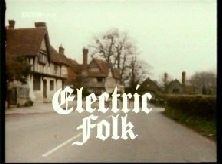
TV Pop Diaries
Pop Music on British Television 1955 -
In 1968 traditional folk singers Tim Hart & Maddy Prior released the first of two volumes of "Folk Songs Of Old England" for the independent Teepee label, while at the same time Fairport Convention, never a steady ship at the best of times, seemed to be heading in a similar musical direction. After a tragic road accident in 1969 the band decamped to Hampshire and assembled what would become Leige and Lief, and the result of their search would define the band for the rest of its life. Despite the album's traditional English folk leanings Ashley Hutchings decided to leave to pursue his own sense of what English traditional folk music was and after meeting up with Hart and Prior in a London club, the band that would become Steeleye Span found its roots.
Signing to RCA the band made their UK TV debut on BBC2's Disco 2 on 11th July 1970, promoting their debut album Hark! The Village Wait, followed by a Sunday lunch appearance on ATV's Music Room playing a live set on 18th October 1970. On TV identity is everything, and the number of TV appearances the band made (more than the Fairports at the time) was probably due to the fact they kept their lead singer, Maddy Prior, while the Fairport's singers were coming and going, with bookers never knowing who you were getting from one appearance to another.
Next up was Granada's Out Front, sharing the stage with Fairport Convention and broadcast
13th July 1971. Things then go quiet until 1973. Despite making their debut album
for Chrysalis, Below The Salt in 1972 their only TV shot this year seems to have
been a repeat of Out Front. BBC2's Full House appearance on 13th January 1973 was
greeted by a mention in the Radio Times "Imagine a group of village singers in 18th-
Chart success means attention, and they got it from Bary Bevins, producer at BBC
TV in Manchester who had the idea of taking the band on the road, but not to typical
concert halls, but instead on location to the UK's stately homes. The first Electric
Folk was broadcast Wednesday 20th March 1974 from 7.35 -
In Monty Pyhton parlance things turn "very silly" on Thursday 24th July 1975 as they
make their second Top Of The Pops appearance. Mike Batt's production skills were
requested for their next Chrysalis album, and as strange as that sounds it worked,
not just in terms of chart success, but musically. He got them. However, there was
a slight problem. His recording alter-
For the second series Electric Folk was moved from an early evening to late night broadcast. The first show on Wednesday 17th September 1975 saw them play the medieval gallery at the The New Inn, Gloucester which is now a restaurant and real ale pub. For show two on 24th September 1975 they popped up at Rivington Hall Barn, Lancashire which looks today like a renovated Saxon barn used for weddings and receptions. We then skip a week due to the Labour Party Conference and back on 8th October 1975, this time at Raby Castle, Durham, an actual medieval castle with a moat and everything! They also now have a yurt cafe.
And that was it, two lots of three shows. The show skips another week due to a theatrical
production, followed by repeats of 20th March 1974 on Wednesday 22nd October 1975,
and the 3rd April 1974 show re-
The fruit of their collaboration with Mike Batt resulted in the All Around My Hat album, and its title song took them back to Television Centre, Thursday 13th November 1975 for another Top Of The Pops.
Crackerjack would eventually come calling, it always does.
In July 2024 an edition of the show was played at an event celebrating the fiftieth anniversary of Now We Are Six at Walthamstow Trades Hall with a Q&A with Maddy Prior.
ELECTRIC FOLK
BBC2
20th March 1974 -
